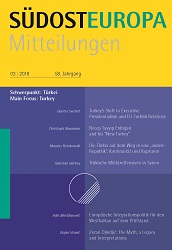Eine nachhaltige europäische Integrationspolitik für den Westbalkan?
A Sustainable European Integration Policy for the Western Balkans?
Testing Five Common Assumptions
Author(s): Adis MerdžanovićSubject(s): Civil Society, EU-Accession / EU-DEvelopment
Published by: Südosteuropa Gesellschaft e.V.
Keywords: Western Balkan region;european integration policy
Summary/Abstract: The article offers a critical look at some of the most common assumptions underlying the Western Balkans’ European integration process. While generally supportive of the goal of EU membership for the states in the region and the EU’s renewed commitment to enlargement in 2018, the contribution highlights important shortcomings in our understanding of EU accession. Firstly, we should not perceive the Western Balkans as a region in crisis but as one with profound structural problems that necessitate a deeper engagement and not a short-term “crisis management”. Likewise, the EU itself is currently undergoing a process of transformation that may put its role as an anchor of stability into question. Secondly, involving civil society in the accession process is crucial, but civil society actors throughout the region may have policy objectives that put accession into question. Thirdly, while parliaments should play a larger role in the process, the prevailing structures prevent their greater involvement andultimately undermine the goal of democratisation. Fourthly, that EU membership is seen positively shouldnot mean that individual reforms in one state cannot be debated and criticised. Fifthly and finally, the EUis not a club whose rules have to be followed, but an inherently flexible structure that new member states may change and improve upon. The article concludes by arguing for a citizen-centred approach so as tomake EU accession sustainable among society’s members.
Journal: Südosteuropa Mitteilungen
- Issue Year: 2018
- Issue No: 03
- Page Range: 62-75
- Page Count: 14
- Language: German
- Content File-PDF

